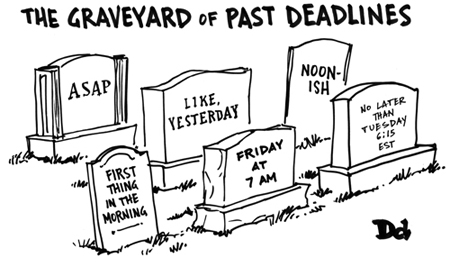No matter how well you plan, your plans are often dependent on other people following through on their commitments. I’m currently dealing with the aftermath of a busy week, complicated by people missing deadlines. We took on an extra project that we knew would make our lives a little more complicated – but it would work if everyone turned in material promptly. But they didn’t. And I should have known they wouldn’t. I currently work a lot with artists from a variety of cultures. I am learning that every culture (and maybe even every person) has a different approach to what is meant by a deadline.

1. Remember your priorities.
Don’t blow your commitment to establishing and creating a better work-life balance just because someone missed a deadline. We all sometimes bow to the tyranny of the urgent. A blown deadline creates a back load of work that sometimes screams loudly for immediate focus. These loud cries often demand a disproportionate amount of attention. This added commitment of time can often distract from the real priorities in your life during a given week.
For example, a missed deadline from one party meant that I was working longer hours to catch up on the work that needed to get done. This extra work invaded the time I had set aside for my family.
A missed deadline means I am getting stress-filled emails when I should be focusing on the current project, and the people involved in the current project.
Sometimes the project that is overdue is the priority, but that should be a value decision, not simply a case of the squeaky wheel getting the grease, or the loudest voice winning the discussion. Let your priorities have a loud enough voice.
2. Remember that somebody always pays.
This is my wife’s mantra, especially when it comes to purchasing a T-shirt for 3 bucks at some clothing warehouse. Sure, we are saving money – but the people who made the T-shirt are “paying” because they received lower wages. Or when someone sells you a 100 dollar pair of jeans for 25 bucks – you know the original purchaser paid, and you are getting a deal.
This also applies when someone misses a deadline. If you focus on the late project, the next project pays. If you focus too much on the next project, the late project gets later. If you bring your work home, your family pays. If you ask someone to work extra hours, they pay (and you do too, if you own the company.).
Our goal as leaders should be to make sure that the “innocents” pay the least. Asking your family to pay a high price for someone else’s mistake is unfair to them.
3. Remember your values.
What do you value the most as an organization? How is this stated in your vision or mission statement? If your highest value is producing widget X in a timely manner, than a missed deadline is problematic. If you value teaching and training the people you work with, a missed deadline can also be seen as a teaching moment.
One of our values is being a “greenhouse”, where people can discover and develop their skills. When someone misses a deadline, we are learning to treat that as a “greenhouse lesson.” In the greenhouse, the plants are protected – but they still have to grow.
We work with some artists who are exhibiting for the first time. We work with people from a variety of cultures. Many people are working in their 2nd or 3rd language. There are lots of crossed wires and the learning curve is high. That does not mean we should allow sloppiness, but it does mean we make some allowances for learning – and try to teach those lessons gently, whenever possible.
Another of our values is that people can be creative and experience joy. For me, as an organizer, I have to learn that many creative people have a different definition of deadline than I do. Their operating concept of time functions in a fundamentally different way. I do not want my rigidness to create an environment that is overly stressful for them. However some things, like print deadlines, are not exactly forgiving. So we have to learn to work in a way that allows us both to experience joy – which usually means lots of communication without being patronizing. It is a skill I am still learning.
4. Remember your own shortcomings.
Whenever someone misses a deadline with me, it reminds me of the deadlines I have missed. I am also married to a creative person, and have witnessed the tension of staying in the creative flow and finishing one more part of a project versus having to stop to meet a deadline. Creative people know that some interruptions make their work harder, because they will have to spend time later reacquiring that creative energy. As someone who is lacking a little in the creative side, I need to remember that I also fall a little short in the understanding department in this area – and I need to be sensitive to that.
It is easy to focus on the shortcomings of others (if only they were more like me!) – but that would also leave our world a much less colorful place.
5. Remember grace.
I am not referring to the grace a ballet dancer shows in their movements, or the grace of a polished person as they walk through a room. I am referring to the virtue of grace. From a Biblical point of view, grace is defined as unmerited divine kindness. From a human virtue point of view it means that I show people kindness that they do not deserve. When a deadline is missed, I can gift people with kindness that they have not earned. I can show them grace.
I can remember key incidents when other people have shown me grace. And because I have received and benefited from grace, I know the value of it. I am learning to show that grace more often to others. A lack of grace is also an indicator of character deficiency, especially when we expect it from others but are unwilling to show it to others.
These keys have been helping me – what have you learned in your leadership journey?

Recent Comments